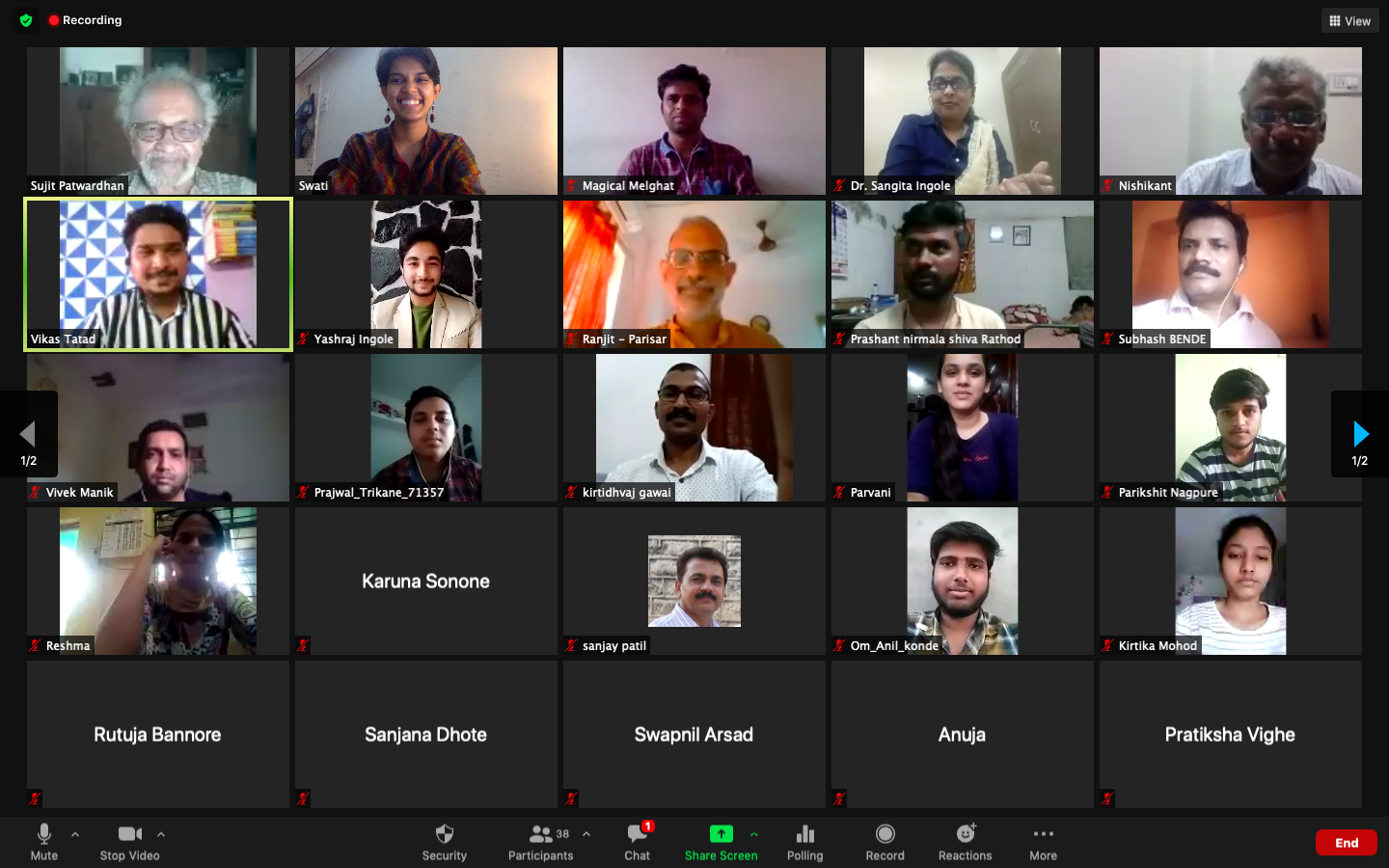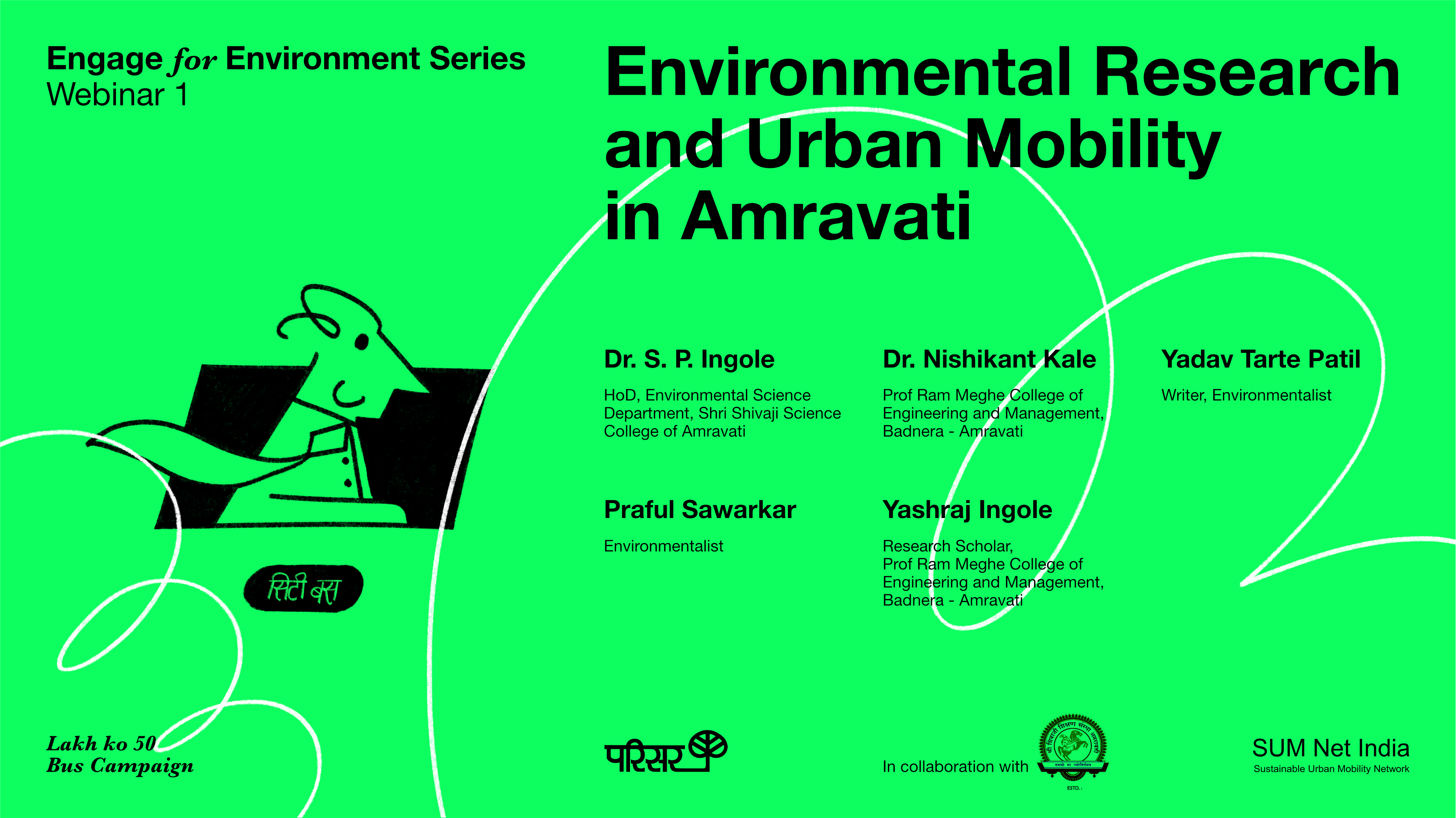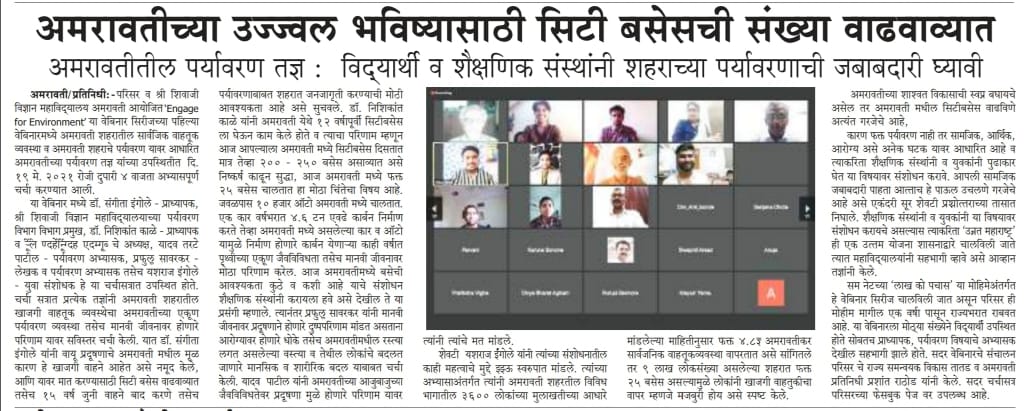A web roundtable was organised as part of Parisar’s multi-city webinar series titled ‘Engage for Environment: Environmental Research and Urban Mobility’, in collaboration with Shri Shivaji Science College of Amravati. This webinar series is part of a statewide campaign, ‘Lakh ko 50’ which demands a comprehensive program or policy by the Maharashtra State Government to ensure that the citizens in all the cities of the state are assured a good bus-based public transport system. The campaign highlights the need for at least 50 buses per lakh urban residents, a benchmark set by the Ministry of Housing and Urban Affairs.

“Research plays an important role in providing solutions as much as defining the problems accurately. It’s crucial to understand how educational institutions and experts understand the linkages between environment and urban mobility to make Amravati clean and green”, said Vikas Tatad, campaign coordinator at Parisar providing a brief context to the webinar. The discussion was held virtually and live streamed on Parisar’s Facebook page.
Dr. Sangita Ingole, Head of Environmental Science Department at Shri Shivaji Science College (SSSC) highlighted that the environment is a complex interlinked system due to which a comprehensive approach like A-S-I i.e. Avoid/Reduce, Shift/Maintain, Improve is required to reduce the environmental impact of transport. Increasing the number of buses and its efficiency can reduce the need for motorized travel and its length. A modal shift from energy consuming and polluting transport modes to environmentally friendly modes is crucial. “Improvement of the energy sources required for the operation through source correction method and optimization of the operational efficiency of public transport is the third important key”, elaborated Dr. Ingole.
Dr. Nishikant Kale, a Climate Reality Leader from the Nature Conservation Society Amravati (NCSA) and Yashraj Ingole, a young researcher from Panjabrao Deshmukh Polytechnic Institute presented a snapshot of Amaravti’s environmental and public transport status. While Amravati Municipal Corporation had a contractual liability to run 100 buses, only 25-30 buses are in operation. “Resultantly, personal vehicles are excessively used and auto-rickshaws are grossly misused as public transport which has resulted in tremendous increase in pollution levels. Only 30 buses for a population of 9 lakhs shows the pathetic condition of both public transport and environment in Amravati”, opined Dr. Kale. As on 31st March 2020, a study estimated around 2.4 lakh two-wheelers and 7100 three-wheelers, considerably higher as compared to other similar-sized cities, in Amravati.
Mr. Yashraj substantiated these points by showing that over the years the percentage of two-wheelers has tremendously increased from a mere 8.8% in 1952 to a whopping 74% in 2017 while buses have reduced from a decent 11.1% in 1951 to a mere 0.74% in 2017. He added, “in a scenario as bleak as this, concerns like proper bus stops also become secondary.”
Environmentalists Mr. Yadav Tarte Patil and Praful Sawarkar (associated with Melghat Tiger Project Amravati) highlighted the series of combined negative effects of transport operations with almost absent bus services like air and noise pollution, its psychosocial impacts from noise, impacts on the nature, landscape and urban biodiversity. They expressed the need of greenery as a critical calming factor to fight the hidden pandemic of mental illness and the dependency of city wildlife on city’s greenery.

The panel shared the different ways in which educational institutions in Amravati have collaborated with decision-making bodies in the past, and speculated about their role in the future. Dr. Ingole mentioned the environmental literacy project where door-to-door mobility surveys were conducted by the students of SSSC. Mr. Sawarkar backed the importance of these surveys by students and recommended their inclusion in the curriculum. Dr. Ingole also elaborated on SSSC’s MoU with Amravati Municipal Corporation (AMC) under which the Environmental Science Department at the College monitors ambient air quality and noise pollution, and submits reports to the Corporation. Dr. Kale described the campaign by the Nature Conservation Society Amravati (NCSA) a decade back which sensitized policymakers and organized a series of multi-stakeholders consultations on deteriorating air quality in the city and the need for better public transport. He credited the 30 odd buses which run in Amravati today to the efforts of this campaign.
Dr. Kale also requested Dr. Ingole to take up a study at her institution which studies the travel demands and patterns of the people in the city and accordingly suggest the routes, frequency and time-table of buses for efficient operation. Yashraj Ingole added that busy areas in the city like Pote township, Arjun Nagar, etc. can benefit from route rationalization and trip planning.
Dr. Kale then delineated the Unnat Maharashtra Abhiyan (UMA) by the Ministry of Higher and Technical Education which, according to him, provided a significant opportunity for students to engage with local development issues. He suggested, “more educational institutions should be roped under UMA as experiences like these broaden the vision and scope of students’ understanding of issues and also strengthen the channels of collaboration between research and implementation bodies in the city.” The experience of Panjabrao Deshmukh Polytechnic Institute as a member institute under UMA, “provided researchers like me the freedom to think of solutions and leveraged our knowledge and skills for effective solutions in the city”, seconded Mr. Yashraj.
Dr. Ingole and Mr. Sawarkar also talked about the importance of awareness activities. “Green Thursdays are witnessed in Shri Shivaji Science College where no vehicles are allowed in the campus”, explained Dr. Ingole. Summarizing the problem statements and solutions laid out by all the speakers, Ranjit Gadgil, Program Director at Parisar responded, “awareness initiatives like these can have long-term impact only in the presence of a basic, effective public transport system.”

Mr. Gadgil also talked about the role that academic institutions can play in assisting the city corporation to prepare the Environment Status Report (ESR), an important tool for the governing body as well as the citizens’ which is both a source of information and education. As per the MMC‘s (Maharashtra Municipal Corporations) Act 1949, section 67 (A), it is mandatory for all the ULBs of the state of Maharashtra, to submit an annual ESR to the General Body.
Appreciating the importance of discussions like these, Sujit Patwardhan, the founder member and trustee of Parisar, thanked all the speakers for their valuable inputs and expressed that the ‘Lakh ko 50’ campaign will keep coming back to these city-specific learnings to further the demand for efficient bus services in all the 27 Municipal Corporations of Maharashtra.
The ‘Lakh ko 50’ campaign has been launched by the Sustainable Urban Mobility Network (SUM Net), a coalition of individuals, voluntary organizations, and civil society networks and movements promoting sustainable urban transport solutions across India.